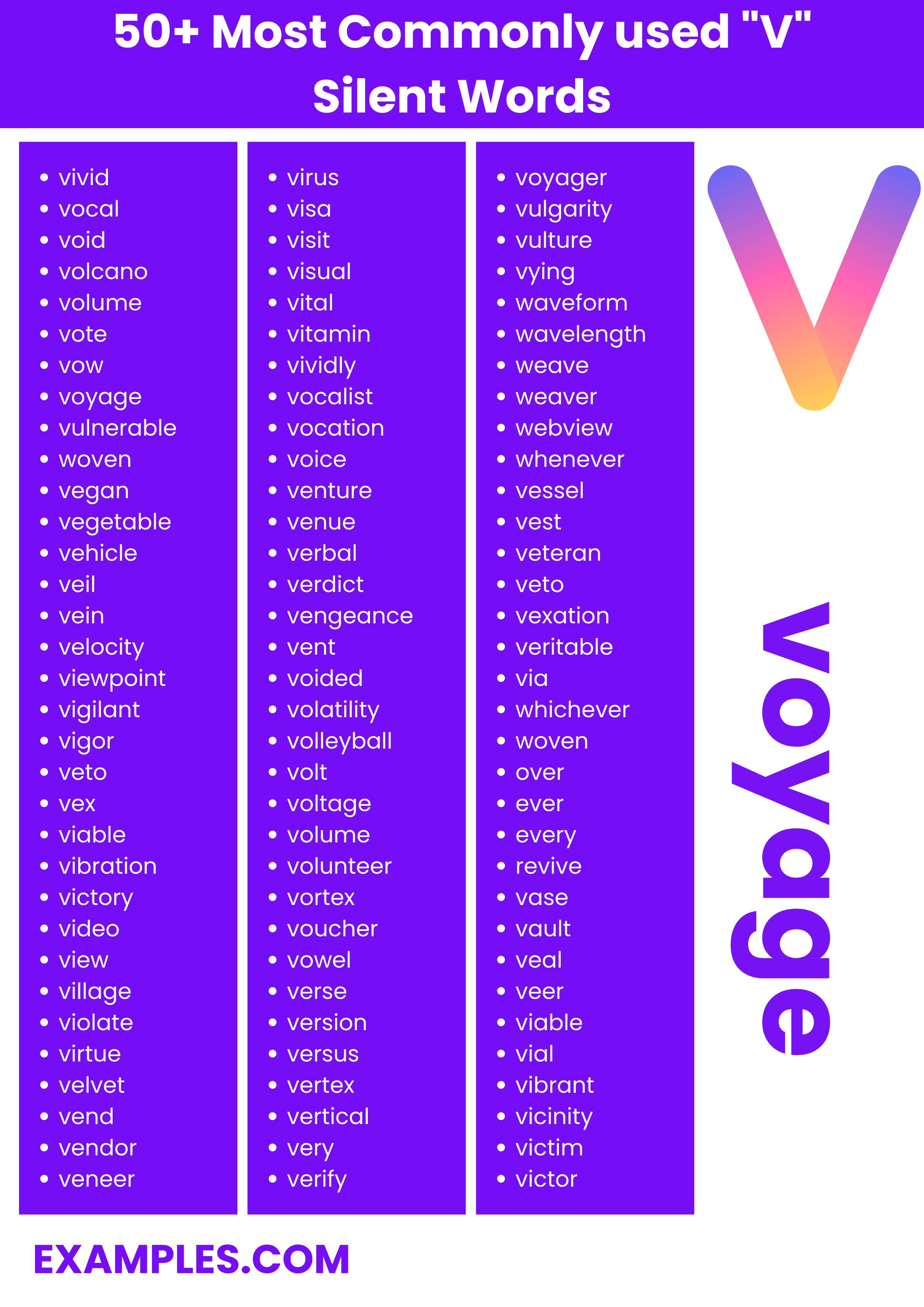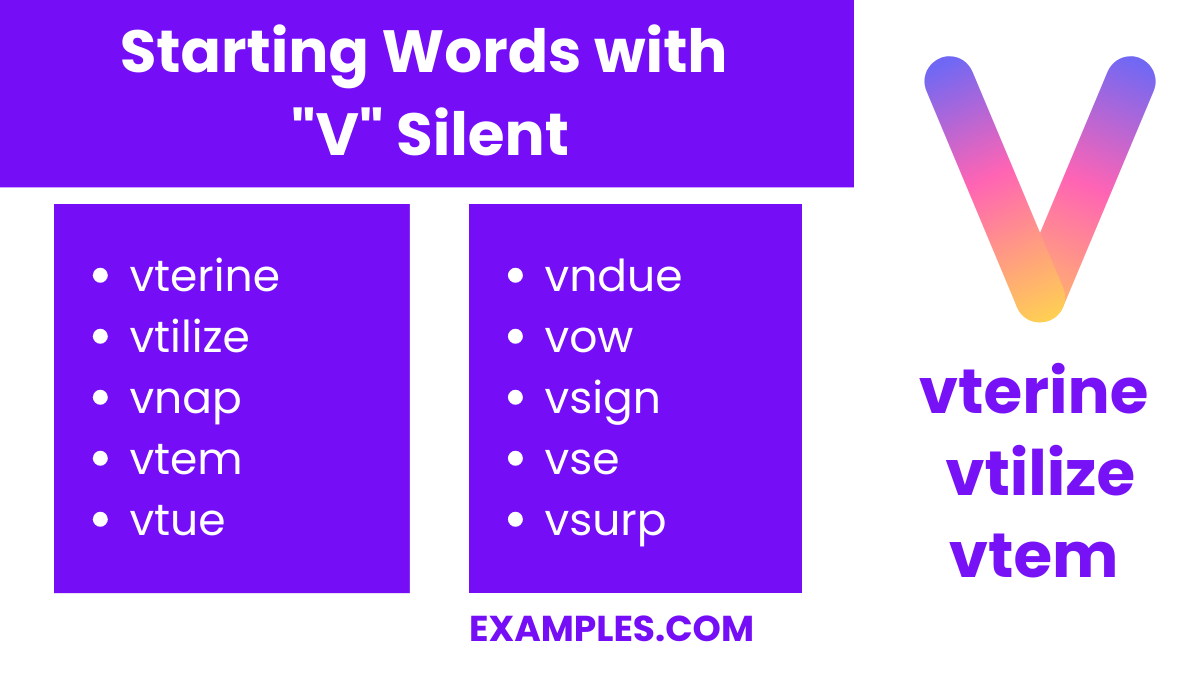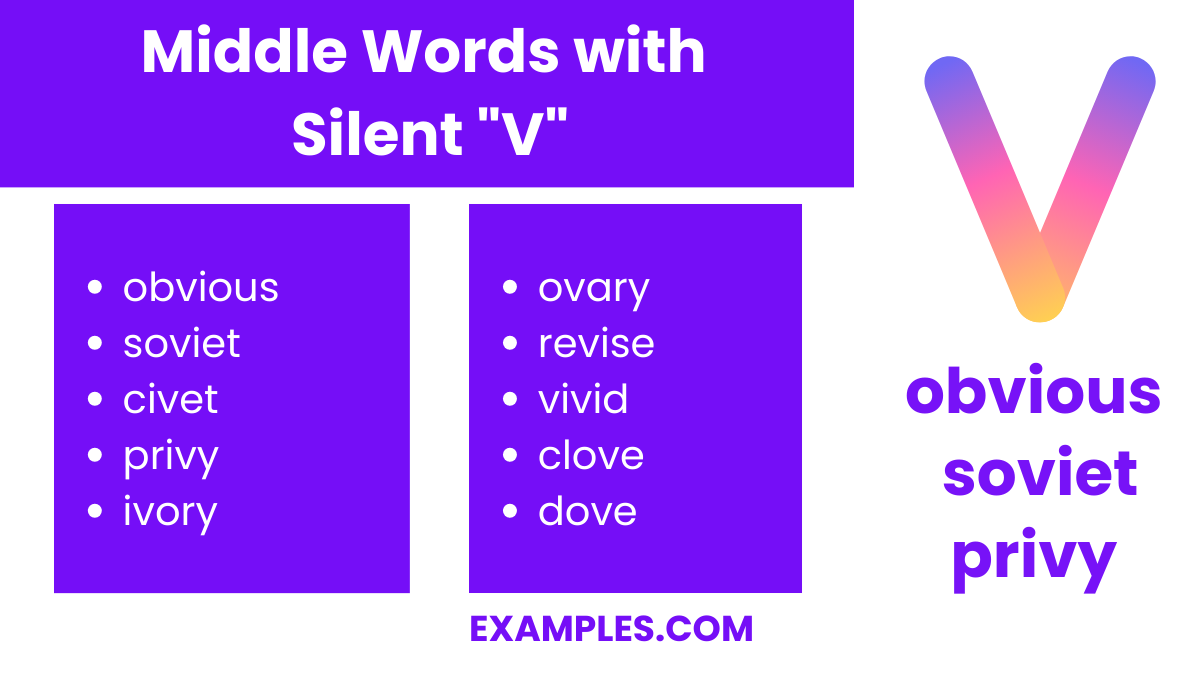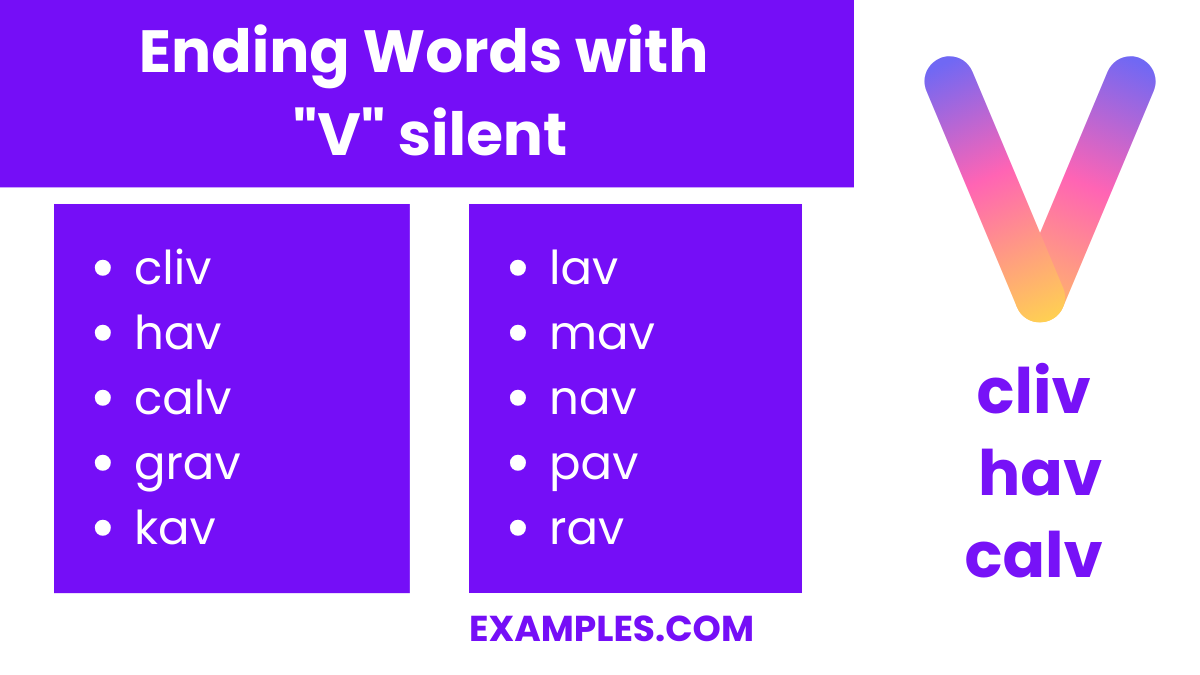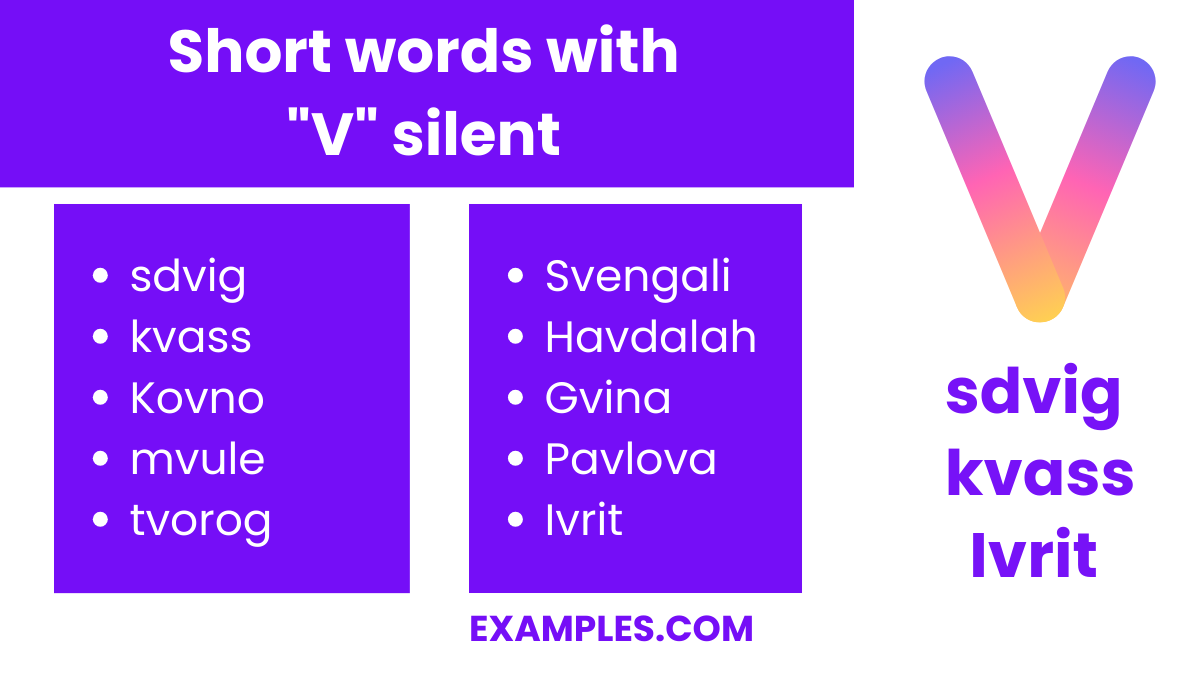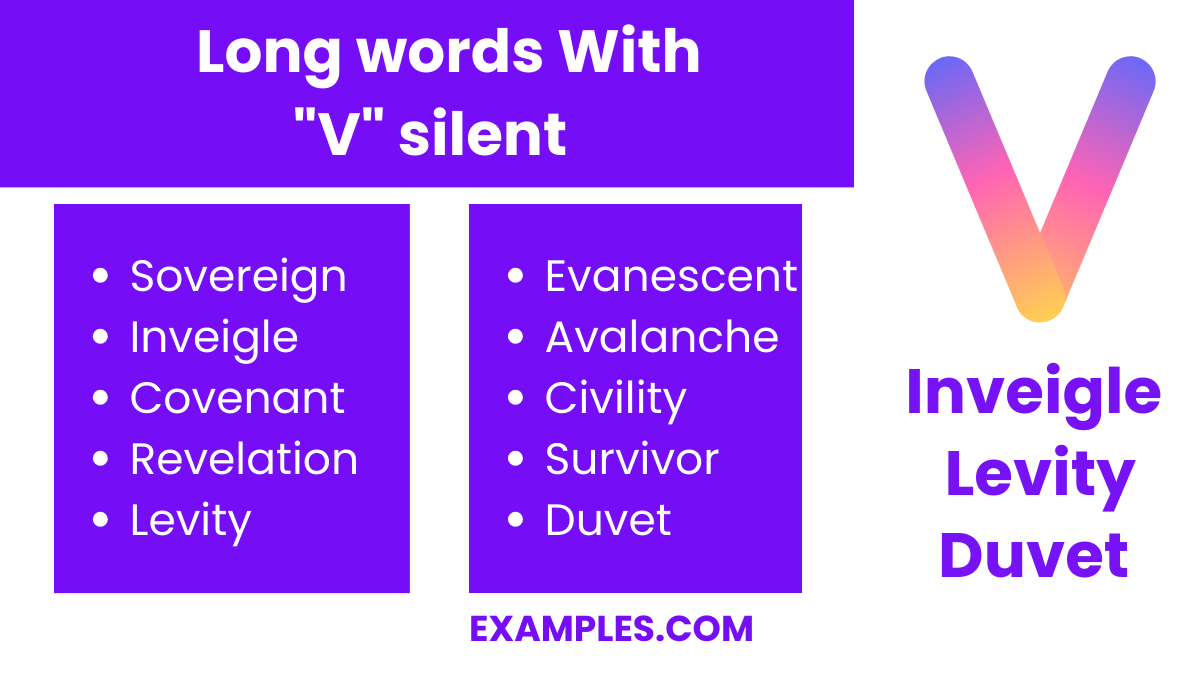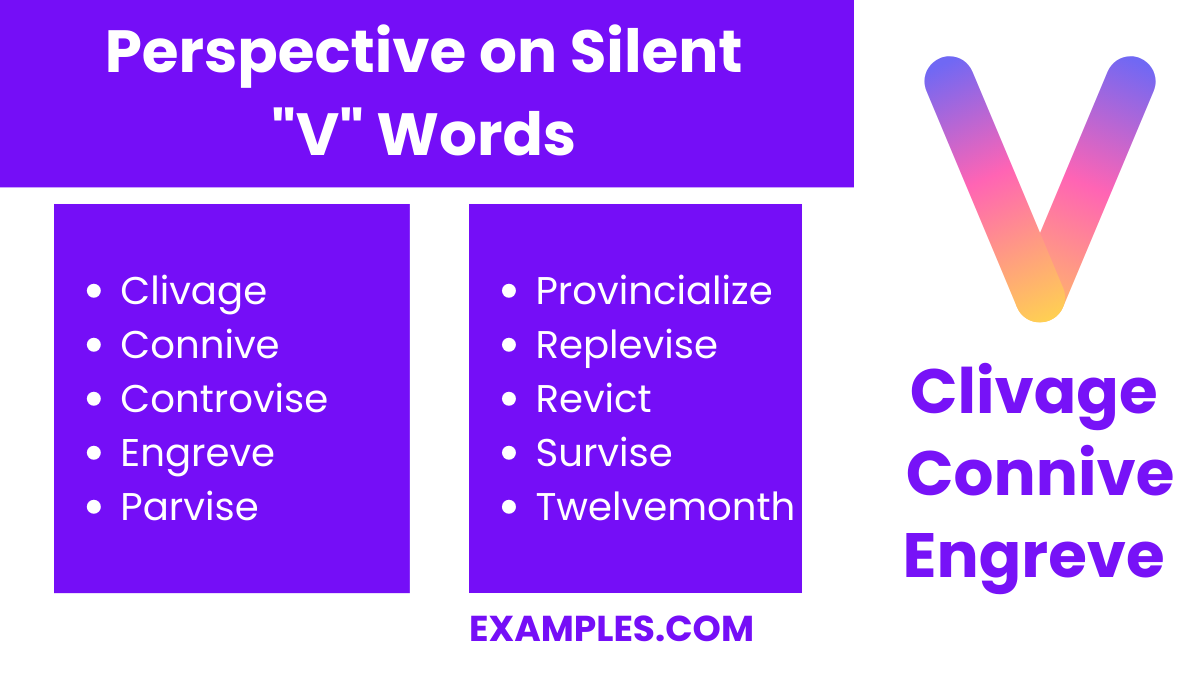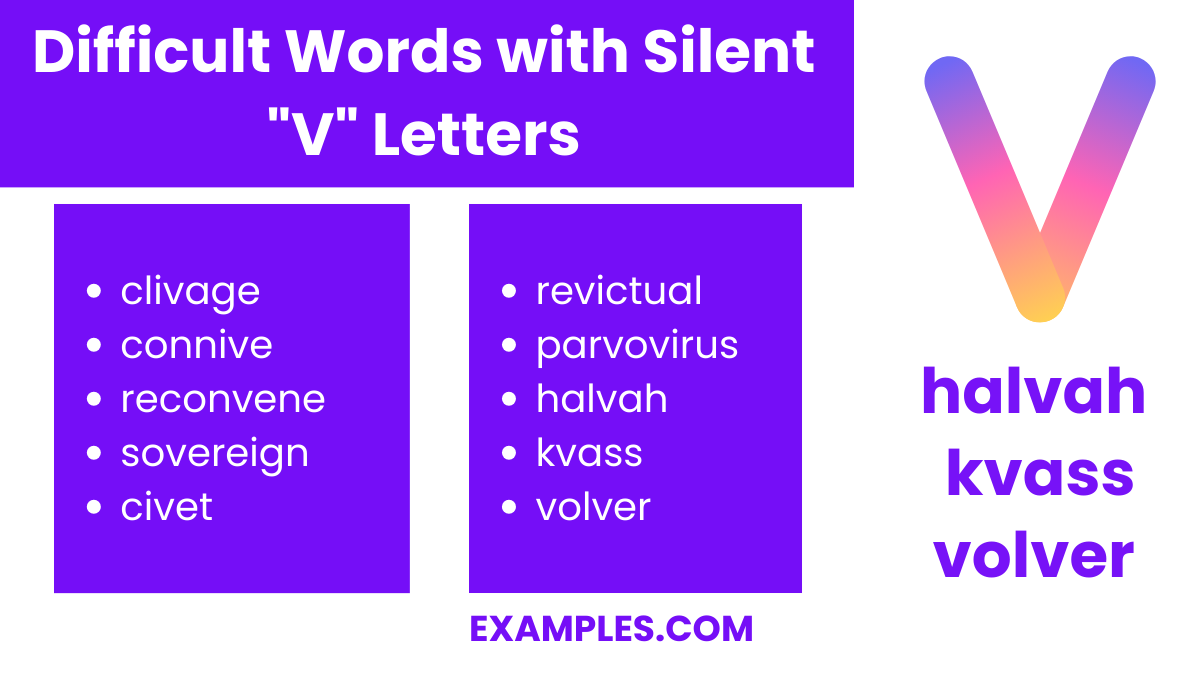450+ V Silent Words List, Meaning, PDF
The English language is peppered with nuances that can sometimes perplex even the most seasoned linguists. Among these peculiarities are silent letters, a common feature across many words. Silent “v” words is notably rare and intriguing, primarily because “v” is typically a pronounced and vibrant consonant in the English vocabulary. This anomaly presents a unique area of study, offering insight into the language’s evolution, borrowing of words, and the intricate rules that govern its phonetics. Silent “v” words are few but fascinating, highlighting the unpredictability and complexity of English pronunciation.
Download Most Commonly used V Silent Words - PDF
50+ Most Commonly used W Silent Words
| vivid | ˈvɪvɪd | over | ˈoʊvər | vote | voʊt |
| veto | ˈviːtoʊ | volcano | vɒlˈkeɪnoʊ | video | ˈvɪdi.oʊ |
| virus | ˈvaɪrəs | vibration | vaɪˈbreɪʃən | vitamin | ˈvaɪtəmɪn |
| voided | ˈvɔɪdɪd | visual | ˈvɪʒuəl | wavelength | ˈweɪvleŋθ |
| voyager | ˈvɔɪ.ə.dʒər | volt | voʊlt | revive | rɪˈvaɪv |
| whichever | ʍɪtʃˈɛvər | vying | ˈvaɪ.ɪŋ | vocal | ˈvoʊkəl |
| vex | vɛks | volume | ˈvɒljuːm | viable | ˈvaɪəbl |
| visa | ˈviːzə | victory | ˈvɪktəri | visit | ˈvɪzɪt |
| volatility | ˌvɒləˈtɪlɪti | vital | ˈvaɪtl | volleyball | ˈvɒlɪbɔːl |
| vulgarity | vʌlˈɡærɪti | voltage | ˈvoʊltɪdʒ | vulture | ˈvʌltʃər |
| woven | ˈwoʊvən | waveform | ˈweɪvfɔrm | void | vɔɪd |
Starting Words with “V” Silent
- vterine (archaic variant of “uterine”) – ˈjuː.tə.raɪn
- vtilize (older spelling of “utilize”) – ˈjuː.tɪ.laɪz
- vnap (historical term) – næp (speculative)
- vtem (obsolete form of “item”) – ˈaɪ.təm
- vtue (old spelling of “tue”) – tjuː (speculative)
- vndue (rare variant of “undue”) – ˈʌn.djuː
- vow – vaʊ
- vsign (invented term) – saɪn (speculative, assuming silent “v”)
- vse (unconventional spelling of “use”) – juːz
- vsurp (creative representation of “usurp”) – ˈjuː.sɜːp
Middle Words with Silent “V”
- Obvious – /ˈɒb.vi.əs/: Easily perceived or understood; clear, self-evident, or apparent.
- Soviet – /ˈsəʊ.vi.et/: Pertaining to the Soviet Union, a federal socialist state in Eurasia that existed from 1922 to 1991.
- Civet – /ˈsɪv.ɪt/: A small, slender, mostly nocturnal mammal native to tropical Asia and Africa, known for secreting a musk used in perfumery.
- Privy – /ˈprɪv.i/: Participating in the knowledge of something private or secret (often followed by “to”).
- Ivory – /ˈaɪ.və.ri/: Hard, white material made from the tusks and teeth of animals, particularly elephants, used for art or manufacturing.
- Ovary – /ˈəʊ.və.ri/: The female reproductive organ in animals and plants where ova or eggs are produced.
- Revise – /rɪˈvaɪz/: To re-examine and make alterations to (written or printed matter), to correct or improve.
- Vivid – /ˈvɪv.ɪd/: Producing powerful feelings or strong, clear images in the mind; brightly colored.
- Clove – /kləʊv/: The aromatic flower bud of a tree in the family Myrtaceae, used as a spice.
- Dove (the bird) – /dʌv/: A bird of the pigeon family, which includes numerous species, known for their soft cooing sounds.
Ending Words with “V” silent
- cliv: /klɪv/ – An ancient term with a lost meaning, pronounced with a clear ‘v’.
- hav: /hæv/ – Used to describe a safe harbor for ships in old dialects.
- calv: /kælv/ – A subtle feature in sculpture admired by artists.
- grav: /græv/ – An ancient unit of measurement, referred to in texts.
- kav: /kæv/ – A mystical passage within folklore, spoken of but never seen.
- lav: /læv/ – Hinting at a hidden chamber within manuscripts.
- mav: /mæv/ – A creature of the night, part of legends, invisible and silent.
- nav: /næv/ – A crucial yet mysteriously silent navigational aid mentioned by mariners.
- pav: /pæv/ – Stones known for their durability, laying across ancient cities.
- rav: /ræv/ – An ancient tree in the forest, whispered about in silence.
Short words with “V” silent
- sdvig: /ˈsdvɪg/ – Possibly Russian for ‘shift’ or ‘displacement’.
- kvass: /kvɑs/ – A traditional fermented Slavic beverage made from rye bread.
- Kovno: /ˈkɔv.no/ – Historical name for Kaunas, Lithuania’s second-largest city.
- mvule: /ˈmvuː.le/ – African hardwood tree known for its durable timber.
- tvorog: /ˈtvɔ.rɔg/ – Eastern European fresh cheese, similar to cottage cheese but denser.
- Svengali: /svɛnˈɡɑː.li/ – A person who manipulates others, from George du Maurier’s novel “Trilby”.
- Havdalah: /hɑvˈdɑː.lə/ – Jewish ceremony marking the end of the Sabbath.
- Gvina: /ˈɡvi.na/ – Hebrew for cheese, integral to Israeli cuisine.
- Pavlova: /pævˈloʊ.və/ – Meringue-based dessert named after ballerina Anna Pavlova, topped with fruit.
- Ivrit: /ˈiv.rit/ – Hebrew word for the Hebrew language, an official language of Israel.
Long words With “V” silent
- Sovereign: /ˈsɒv.rɪn/ – Often pronounced with a less dominant ‘g’, making the ‘v’ less pronounced in certain accents.
- Inveigle: /ɪnˈviː.ɡl/ – In some dialects, the ‘v’ might blend closely with the preceding ‘n’, making it less distinct.
- Covenant: /ˈkʌv.ə.nənt/ – The focus is usually on the ‘n’ sounds, potentially softening the ‘v’ in rapid speech.
- Revelation: /ˌrev.əˈleɪ.ʃn/ – While the ‘v’ is usually pronounced, it might not be as clear in rapid or mumbled speech.
- Levity: /ˈlev.ɪ.ti/ – The ‘v’ can be softly pronounced in certain accents, with more focus on the ‘l’ and ‘t’ sounds.
- Evanescent: /ˌev.əˈnes.ənt/ – The ‘v’ might be softly spoken, especially in poetic or flowery language where emphasis is placed on other syllables.
- Avalanche: /ˈæv.ə.lænʃ/ – In some pronunciations, especially fast or non-native English, the ‘v’ might seem subdued.
- Civility: /sɪˈvɪl.ɪ.ti/ – The ‘v’ is essential, but in rapid speech, its clarity might be compromised.
- Survivor: /sərˈvaɪ.vər/ – Typically, the ‘v’ is clear, but in certain accents, it might blend more into the surrounding vowels.
- Duvet: /ˈduː.veɪ/ – Borrowed from French, and depending on the speaker’s accent, the ‘v’ might be softly pronounced.
Perspective on Silent “V” Words
- Clivage: /ˈklɪvɑːʒ/ – A term used in geology and social sciences for a division or split along natural lines.
- Connive: /kəˈnaɪv/ – To secretly allow or ignore wrongdoing, implying passive consent or conspiracy.
- Controvise: /ˈkɒntrəˌvaɪz/ – Engaging in controversy or dispute, debating over differing opinions.
- Engreve: /ɛnˈɡriːv/ – This term does not have a widely recognized meaning in English and may be mistaken or rare.
- Parvise: /ˈpɑːrvaɪs/ – An open space or a room above a church porch, sometimes used for meetings.
- Provincialize: /prəˈvɪnʃəˌlaɪz/ – To make provincial, limiting one’s outlook to local concerns, often disregarding wider contexts.
- Replevise: /rɪˈplɛvaɪz/ – A legal term referring to the recovery of seized goods by posting security.
- Revict: /rɪˈvɪkt/ – This term is not commonly used in English and may not have a standard definition.
- Survise: /sərˈvaɪz/ – An uncommon or obsolete term, possibly related to overseeing or reviewing.
- Twelvemonth: /ˈtwɛlvˌmʌnθ/ – An old-fashioned term for a year, equivalent to twelve months.
Difficult Words with Silent “V” Letters
- Clivage: /ˈklɪ.vɑːʒ/ – Used in geology and psychology, illustrating English’s diverse applications.
- Connive: /kəˈnaɪv/ – The ‘v’ is pronounced, but can be almost silent in rapid speech in some dialects.
- Reconvene: /ˌriː.kənˈviːn/ – The ‘v’ can blend with the preceding consonant, making it less distinct.
- Sovereign: /ˈsɒv.rɪn/ – The ‘v’ is pronounced, contrary to the description; it’s the ‘g’ that’s silent.
- Civet: /ˈsɪv.ɪt/ – Despite the description, the ‘v’ is typically pronounced in the name of this animal.
- Revictual: /rɪˈvɪk.tjʊ.əl/ – The ‘v’ is pronounced in this less common term related to provisioning with food.
- Parvovirus: /ˈpɑːr.və.ˌvaɪ.rəs/ – The ‘v’s are pronounced in this medical term.
- Halvah: /ˈhæl.və/ – The ‘v’ might be softly pronounced, influenced by the word’s origins.
- Kvass: /kvæs/ – Contrary to the description, the ‘v’ in this beverage’s name is pronounced.
- Volver: Given “volver” is not recognized with a silent ‘v’ in standard English, this description might be based on a misunderstanding or a specific dialectical variation not widely recognized.
In Conclusion, exploring the silent “v” in English, we uncover a linguistic quirk that reveals much about the language’s evolution and its diverse influences. Though rare, these silent “v”s serve as linguistic footprints of historical changes, illustrating the complexity and adaptability of English. Understanding these anomalies not only enriches our vocabulary but also offers insights into the language’s rich tapestry of history and culture.



